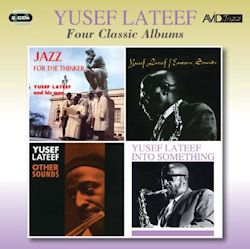Jazz for the Thinker
Happyology
O’Blues
Midday
Polarity
Space
Eastern Sounds
The Plum Blossom
Blues for the Orient
Ching Miau
Don’t Blame Me
Love Theme from Spartacus
Snafu
Purple Flower
Love Theme from The Robe
The Three Faces of Baal
Other Sounds
All Alone
Anastasia
Minor Mood
Taboo
Lambert’s Point
Mahaba
Into Something
Rasheed
When You’re Smiling
Watwer Pistol
You;’ve Changed
I’ll Remember April
Koko’s Tune
P.Bouk
Yusef Lateef (tenor saxophone, oboe, flute, argol) with
Jazz for the Thinker
- Curtis Fuller (trombone): Hugh Lawson (piano): Ernie Farrow (bass): Louis Hayes (drums)
Eastern Sounds
– Barry Harris (piano): Ernie Farrow (bass): Lex Humphries (drums)
Other Sounds
– Wilbur Harden (flugelhorn): Hugh Lawson (piano, finger cymbals): Ernie Farrow (bass): Oliver Jackson (drums, earth-board)
Into Something
- Barry Harris (piano): Herman Wright (bass): Elvin Jones (drums)
Recorded 1957 and 1961 [78:27 + 80:00]
Avid’s four-LP strategy works well with these reissues. Two albums come from 1957, and two from 1961, all showing how Yusef Lateef married Hard Bop with
African and indeed Asiastic influences. Jazz for the Thinker has the most straight-ahead instrumentation, Lateef limiting himself to tenor sax
where elsewhere he plays his oboe and flute, as well as the argol on Other Sounds. Blues-rich elements haunt this 1957 album and even when the
themes themselves are not especially distinctive – I’d cite Polarity as one of Lateef’s least interesting pieces – there are still things to find
in it: underrated Hugh Lawson’s piano figures, for instance.
Lateef plays the Chinese flute on Eastern Sounds and his ‘blues oboe’ on Blues for the Orient is a pioneering use of the instrument,
Barry Harris adding to the vibe in his astute use of the piano to support Lateef. The sinuous tenor playing in 5/4 on Ching Miau is quite an
extreme way to prepare for Jimmy McHugh’s standard Don’t Blame Me with Harris’s modified Monkisms at the piano, but that’s as nothing when it
comes to Lateef’s predilection for Hollywood soundtracks – the Love theme from Spartacus being one, and the Love theme from The Robe
being another. Listen out as well to the R&B meets Sonny Rollins and Horace Silver approach on Snafu.
In that respect the group which recorded Into Something in 1961 sounds a little more comprehensively successful – Benny Harris again, Herman
Wright, and Elvin Jones. Lateef revisits the Blues for the Orient motif in Rasheed, plays a guttural When You’re Smiling, a
warmly lyric ballad in You’ve Changed and then gives the listener a kind of Portrait of the Artist in a splendid Koko’s Tune where the
interplay between Lateef and Jones is spellbinding. Other Sounds is somewhat less consistent with a garrulous All Alone in particular but
there are strong elements here too, with a particularly evocative Anastasia and the Latin-Arabian vibe of Taboo played on a metal flute
with a ‘hum and blow’ element to the fore, Wilbur Harden’s full-toned brass work, and Lawson’s kicking pianism.
Lateef, incapable of dullness, provides many an ingenious moment instrumentally and compositionally on these four albums, finely restored and complete with
edited versions of the original liner notes.
Jonathan Woolf
